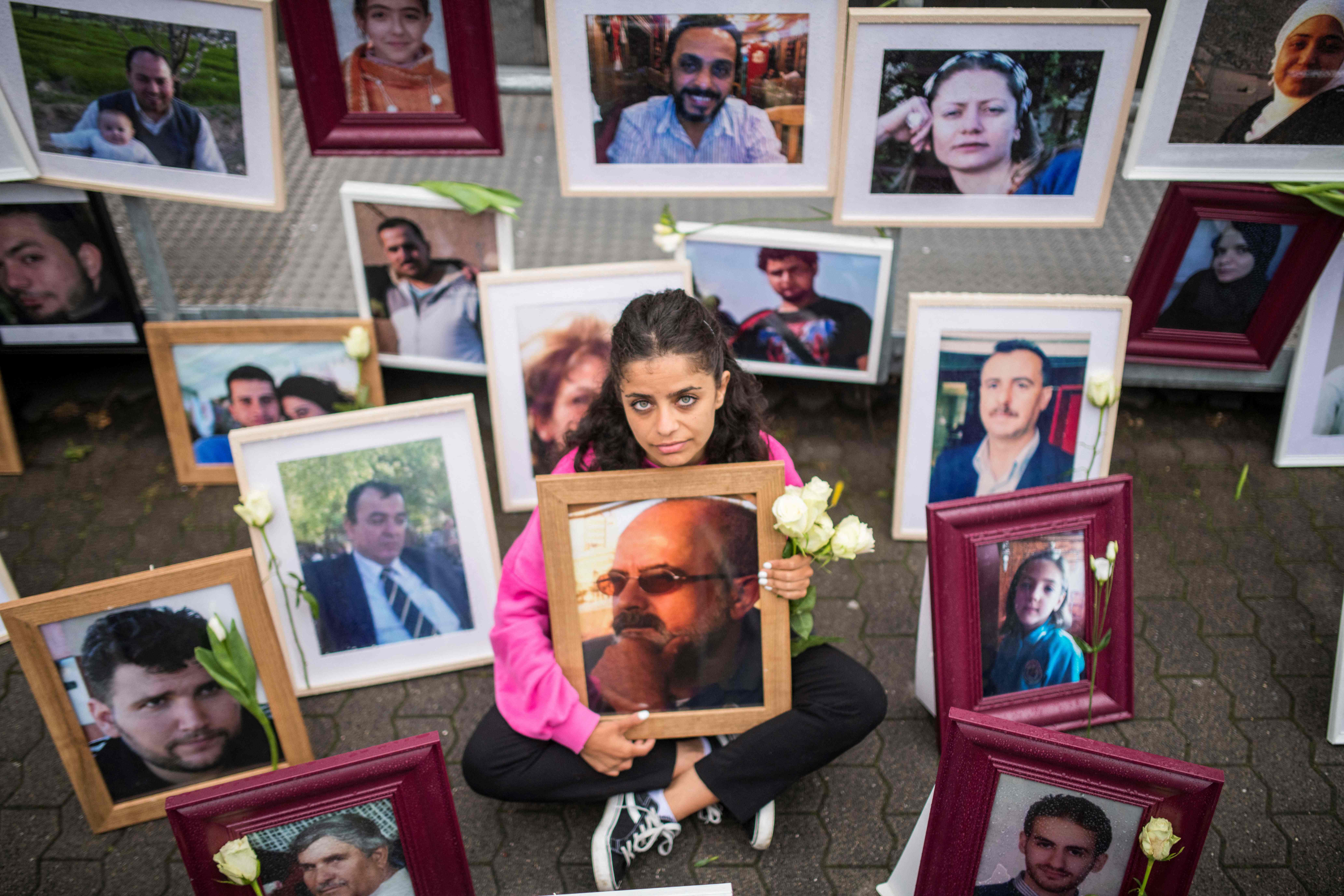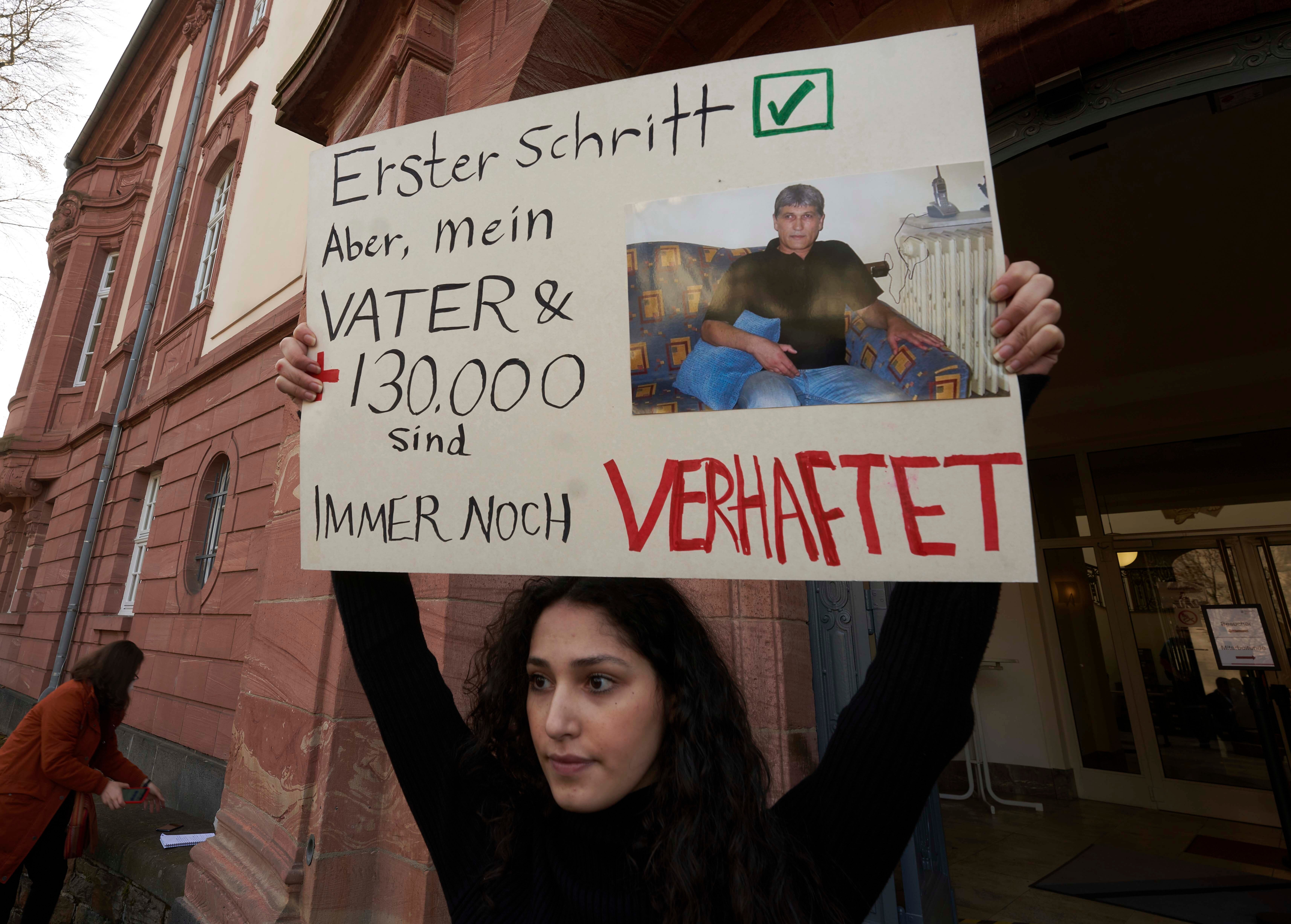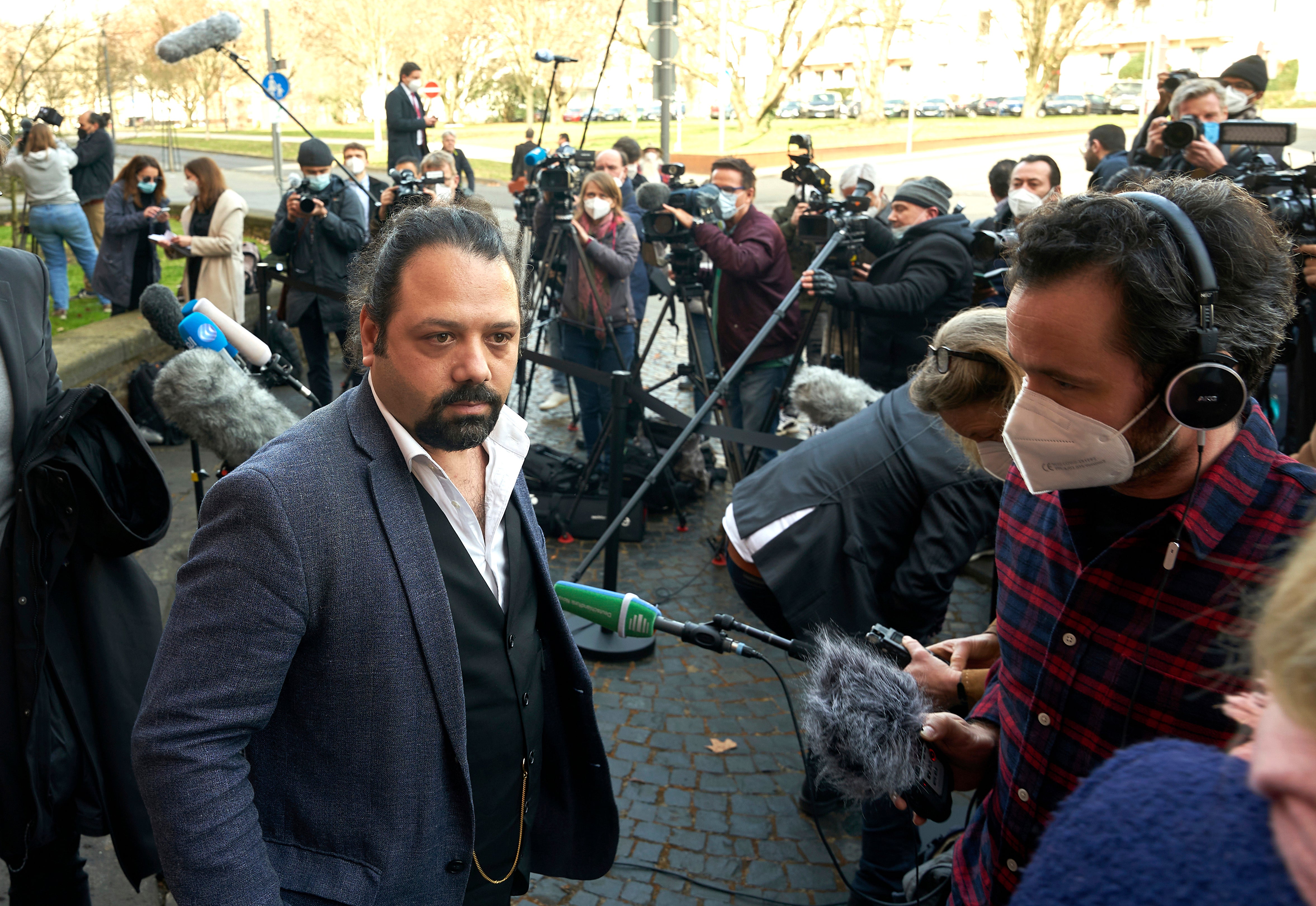Syrian torture survivors brace for verdict in landmark trial on crimes against humanity
The case of a former Syrian intelligence official accused of torture, murder and rape before a German court could prove a vital step towards justice for victims of abuse in Syria’s civil war, reports Bel Trew


Your support helps us to tell the story
From reproductive rights to climate change to Big Tech, The Independent is on the ground when the story is developing. Whether it's investigating the financials of Elon Musk's pro-Trump PAC or producing our latest documentary, 'The A Word', which shines a light on the American women fighting for reproductive rights, we know how important it is to parse out the facts from the messaging.
At such a critical moment in US history, we need reporters on the ground. Your donation allows us to keep sending journalists to speak to both sides of the story.
The Independent is trusted by Americans across the entire political spectrum. And unlike many other quality news outlets, we choose not to lock Americans out of our reporting and analysis with paywalls. We believe quality journalism should be available to everyone, paid for by those who can afford it.
Your support makes all the difference.Survivors of torture in Syria and families of slain activists are bracing for a potentially landmark court verdict in Germany on Thursday, which they hope will pave the way to pursue wider justice for abuses committed during the Syrian civil war that could constitute crimes against humanity.
The two-year legal proceeding held in the German city of Koblenz is the first ever trial on state-sponsored torture in Syria, and secured its first conviction last February when a former member of President Bashar al-Assad’s security services was jailed for abetting the torture of civilians.
Germany’s universal jurisdiction laws allow courts to prosecute crimes against humanity no matter where they take place, and the trial in Koblenz has become a rallying point for those attempting to seek justice for rights abuses committed during Syria’s conflict.
Tens of thousands of people are thought to have been arbitrarily arrested, forcibly disappeared and tortured in the decade since the start of the devastating civil war, according to activist groups including Human Rights Watch.
On Thursday the court is set to decide whether to convict former Syrian colonel Anwar Raslan, 58, who defected in 2012 and claimed asylum in Germany in 2014.
Mr Raslan is accused of being complicit in crimes against humanity by prosecutors who allege that between April 2011 and September 2012, he oversaw the “systematic and brutal torture” of at least 4,000 people that resulted in more than 50 deaths at the notorious Branch 251 facility on Khatib Street in Damascus.
He has also been changed with overseeing sexual assault and the crime of enforced disappearance as a senior officer.
Mr Raslan denies all allegations of abuse and has said he never personally tortured anybody.
If found guilty, Mr Raslan would be the most senior ex-government official to be convicted for atrocities committed in Syria. He could face a life sentence.
The imminent verdict follows the German court’s February 2021 conviction of Eyad al-Gharib, a low-ranking ex-Syrian intelligence officer at a subdivision of Branch 251 on charges of aiding and abetting crimes against humanity. Mr Gharib was sentenced to four-and-a-half years in prison but his lawyers appealed the verdict. The appeal is pending.
Thursday’s verdict is the apex of a determined push for justice
A third defendant, Syrian doctor Alaa M., is expected to go on trial in Germany this year accused of torturing an inmate at a prison run by military intelligence in his home country.
The legal proceedings may pave the way for future efforts to prosecute other Assam regime operatives, say former inmates of Branch 251 who are frustrated that other avenues of justice have been thwarted. Attempts to set up an international tribunal for Syria have failed.
“This trial is the first step in a long road towards justice which will not end until dictator Bashar al-Assad himself, and those who committed crimes against Syrians, appear in front of a fair and dignified trial,” said Wissam Mukdad, 37, a co-plaintiff who — like the defendants — now lives in Germany.
Mr Mukdad told The Independent he was beaten with rifles so badly on arrival at the facility that his ribs were broken. He said he was starved and forced to share a squalid cell with more than 80 others who had to sleep in shifts due to a lack of space. He claimed other detainees were subjected to electric shocks, strung up by their wrists for days, and raped.
“It is not about revenge or retaliation, it is about bringing justice to a wounded nation. Only through justice can we build a future Syria that is home for all Syrians,” he added.
Patrick Kroker, a lawyer with the European Center for Constitutional and Human Rights (ECCHR) that has represented several survivors at the trial, said instances of sexual violence are also being considered as part of the crimes against humanity charge.
He said a key part of the evidence against Mr Raslan was the photographs of alleged torture victims smuggled out of Syria by a former police officer, who goes by the alias of Caesar.
Since the beginning of the protests against Syrian President Bashar al Assad in March 2011, rights groups say authorities have arbitrarily arrested, unlawfully detained, forcibly disappeared, and tortured tens of thousands of people.
The worst abuse and torture took place in an extensive network of detention facilities under the control of the regime’s intelligence agencies.
The Assad regime has repeatedly denied the use of torture or systematic abuse in its detention facilities. It has also denied forcibly disappearing individuals.

According to the Syrian Network for Human Rights (SNHR), at least 100,000 Syrians remain forcibly disappeared. An estimated 15,000 have been tortured to death since March 2011, the majority at the hands of Syrian government forces, the group says.
And so Thursday’s verdict has been hailed as a potentially landmark victory for Syrians and international justice on the whole because it is the first and only trial of its kind.
Both Mr Raslan and Mr Gharib defected from the Syrian government after the start of the revolution against President Assad and eventually sought asylum in Germany, where investigations were then triggered under the law of universal jurisdiction.
About 800,000 Syrians have sought refuge in Germany since the start of the war, including Mr Raslan and Mr Gharib, who were arrested in 2019.
Rights groups say it is particularly important that a respected court is exposing Syria’s systemic atrocities now when so many countries are rushing to embrace President Assad, who has effectively won the decade-long bloody conflict.
Yet it appears unlikely that the Syrian president will ever set foot inside a courtroom.
As head of state, he is immune from prosecution before the courts of a third country like Germany. The International Criminal Court (ICC) cannot investigate crimes committed in Syria because it is not a member state of the Rome Statute that established the ICC, and because Russia and China have blocked efforts through vetoes at the UN Security Council to trigger proceedings.
I had to use my hands to support my broken ribs as they beat me
The road towards accountability has therefore been a rocky one and more must be done, said Balkees Jarrah, part of the International Transitional Justice programme at Human Rights Watch, which has been monitoring the trial.
“Thursday’s verdict is the apex of a determined push for justice that is significant not only because of the high rank of one of the suspects but also because it has addressed the type of brutal criminality that has been emblematic of the conflict in Syria,” she told The Independent.
“There has been an uptick in similar cases relying on the principle of universal jurisdiction but these kinds of cases are not enough on their own.
“If anything they highlight the need for a more comprehensive justice process to address the ongoing impunity in Syria,” she added.
During the trial, former inmates of Branch 251 have testified in open court hearings about what happened.
In a testimony recounted by the ECCHR last year, Oscar-nominated filmmaker Feras Fayyad described his detention inside the Khatib Street facility.
Mr Fayyad recounted beatings with hard cables and clubs on his feet and back. He said he had been hung by his hands and sexual assault.
Despite having been blindfolded, he thinks Mr Raslan was one of his tormentors - a view shared by Mr Mukdad.
“I could tell from the voice there was one same officer in charge of all my three interrogations,” Mr Mukdad said, referring to the man he believed to be Mr Raslan.
“From the beginning, he ordered me to lay down on my belly and to raise my feet up. I had to use my hands to support my broken ribs as they beat me.”

Mr Mukdad, a singer, said he was arrested on the street after attempting to join a protest. He said guards burnt off the hair of detainees with lighters before stripping them. He said they would be given just a handful of olives for food meaning he lost 17 kilos in as many days.
Many survivors and family members of those killed or disappeared in Syria’s prisons have focused on the Koblenz trial, hoping it could become a blueprint for further convictions.
Mariam Alhallaq is among them. Now living in Germany, she is president of an association representing families of slain activists that has been campaigning during the trial for justice.
Her son Ayham Ghazzoul, a dentist, activist and lecturer at Damascus University, was 25 years old when he died in 2012 while detained by intelligence officials.
A photo of his mutilated body appeared among the huge cache of images shared by the former police officer known as Caesar.
Ms Alhallaq said a fellow inmate told her the guards removed her son’s fingernails, doused him with boiling water and beat him so severely he lost consciousness. She believes her son eventually died from internal bleeding after five days of torture.
“I hope that Mr Raslan will be sentenced to life in order to set a judicial precedent and an example for present or future cases brought in front of the European judiciary,” she told The Independent.
Lamis Alkhateeb, 33, from the women-led Families for Freedom that campaigns for justice for those detained and disappeared in Syria, attended the trials and organised vigils in front of the court. She said she hoped the verdict would spotlight the plight of the tens of thousands of Syrians who are still missing.
“Although we are happy to see these trials taking place, it is also important for us to see these crimes stopped, and the whereabouts of people found,” she said.



Join our commenting forum
Join thought-provoking conversations, follow other Independent readers and see their replies
Comments